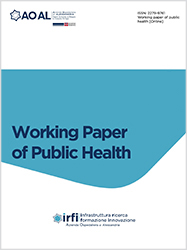Interprofessional training: synergies for controlling patient safety outcomes
Accepted: 11 July 2016
All claims expressed in this article are solely those of the authors and do not necessarily represent those of their affiliated organizations, or those of the publisher, the editors and the reviewers. Any product that may be evaluated in this article or claim that may be made by its manufacturer is not guaranteed or endorsed by the publisher.
Objectives: The aim of the study is to evaluate the effectiveness of learning in participants of field training initiatives, with respect to critical and reflective thinking skills, in order to test whether mono-professional or multi-professional groups are more effective in developing projects aimed at preventing adverse patient events. Methodology: Literature review, retrospective quantitative analysis and qualitative analysis by conducting focus groups. Results: A positive correlation emerged between critical-reflexive skills and interprofessional training, and between the latter and the control of adverse patient outcomes. Conclusions: The quantitative survey highlighted some risks related to interprofessional training, subsequently analysed with a SWOT matrix, which induce to pay particular attention to the design, to be carried out also through methodologies that include stakeholder engagement. The development of interprofessional training increases collaboration between team members and between services; it helps to standardise behaviour and improve communication with users; all this leads to rapid, appropriate and shared decisions.
PAGEPress has chosen to apply the Creative Commons Attribution NonCommercial 4.0 International License (CC BY-NC 4.0) to all manuscripts to be published.

 https://doi.org/10.4081/wpph.2015.6709
https://doi.org/10.4081/wpph.2015.6709




